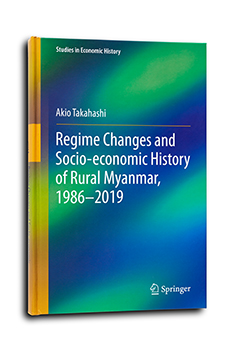
This is the first book to depict the transformation and steadiness of Myanmar’s rural socio-economy from within the villages based on my own detailed research, in relation with the regime changes from Burmese Way to Socialism to military junta and to democratization from 1986 to 2019.
The main subject of the transformation is “de-agrarianisation” including land use and holdings, household incomes, non-, migrations, power structure, village landscape, etc. And the principal theme of the steadiness is the “absence of village collective” which is the core of rural Myanmar, in contrast to village communities like Japan. This is the reason why Myanmar villagers have lived surprisingly bright, free and independent despite the oppressive political economy under the socialism and the military junta, and have not collectively participated in so-called community development.
This book is the result of research conducted by visiting more than 200 villages and interviewing more than 10,000 people by myself in Myanmar language.
(–This text refers to the hardcover edition.)
Table of contents
| 1. | Introduction: The History of Myanmar’s Political and Economic System, and the Structure of This Book |
|---|---|
| 2. | Agricultural and Rural Policies Amid Regime Changes |
| 3 | Agriculture and Rural Villages in the National Economy |
| 4. | A Socio-economic History of Two Villages |
| 5. | Revitalising a Village Through Buddhism: Thindaunggyi Village and Shwetheindaw Paya |
| 6. | Villagers on the Move: Mixed Multi-ethnic Settlement in Zeepinwea Village |
| 7. | Myanmar Village Society: Comparing with Japan and Thailand |
| 8. | A Myanmar Village is a Community of Life |
| 9. | Conclusion: Change and Continuity in the Social Economy of Rural Myanmar |
| Epilogue | |
| Bibliography | |
| Index | |
Info
Akio Takahashi
Regime Changes and Socio-economic History of Rural Myanmar, 1986-2019
Springer, 284 pages, 2024.1, ISBN: 978-981-99-3271-9
